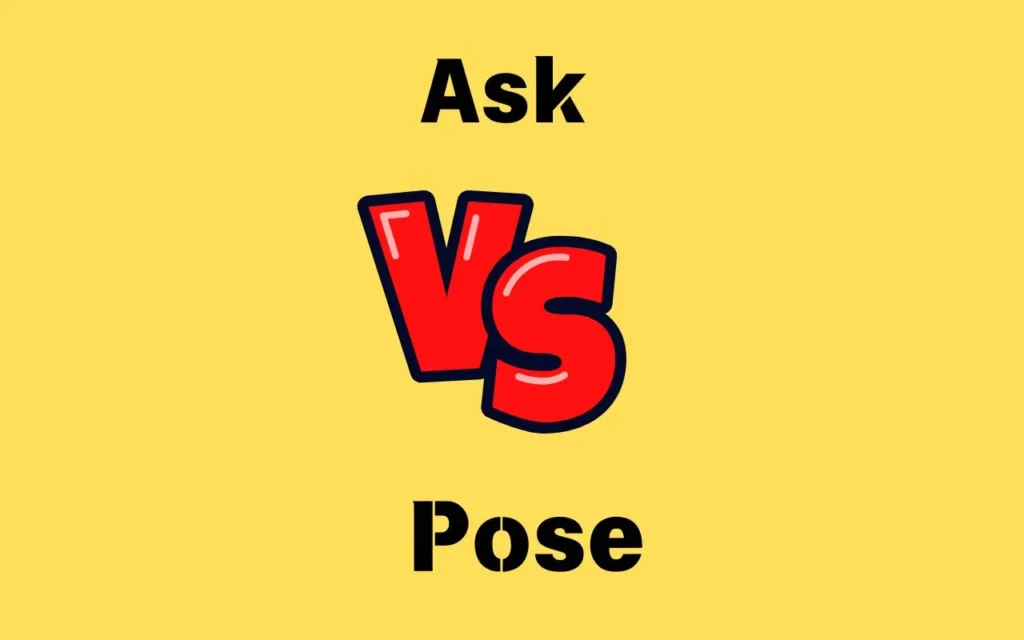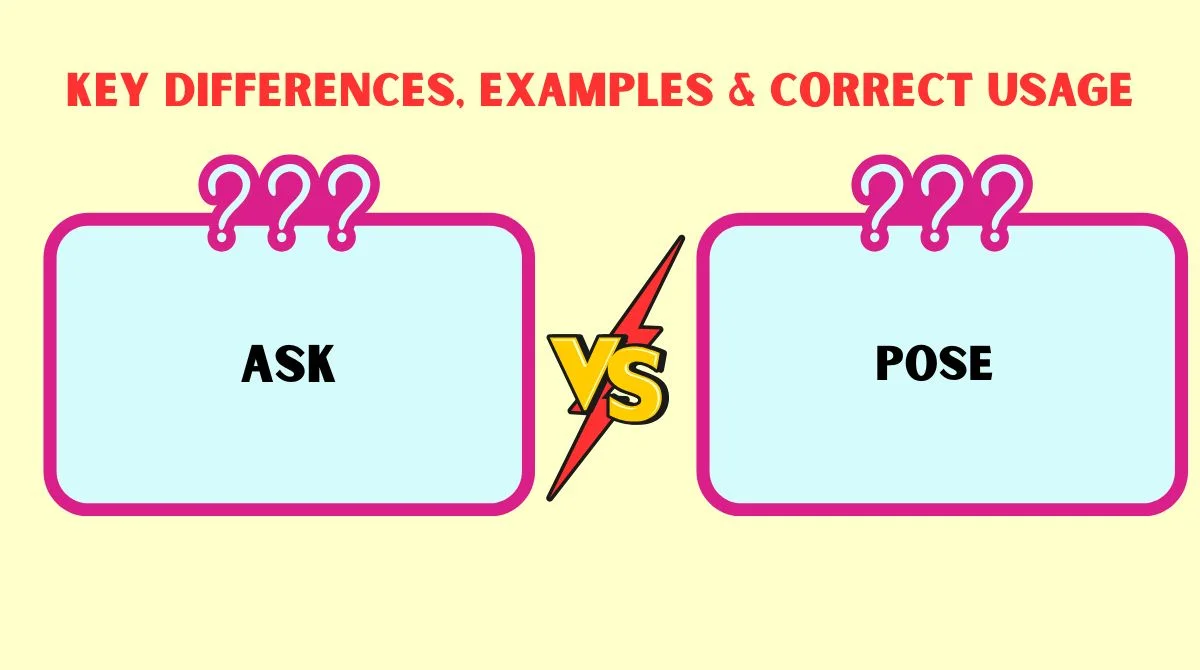Last updated on September 26th, 2025 at 01:50 pm
Have you ever stopped mid-sentence, wondering whether you should ask a question or pose one? At first glance, both verbs seem to do the same job.
Yet in English, the choice between ask and pose can completely shift the tone, context, and even the level of formality in your message.
Here’s the key takeaway: “Ask” is the go-to verb for everyday questions and requests, while “pose” is typically used in formal, academic, or philosophical settings when you frame a question for thought or discussion.
That distinction might sound simple, but in practice, learners often misuse “pose,” either making their sentence sound too formal or downright awkward.
This article will break it down clearly: definitions, contexts, nuances, comparisons, practical tips, and plenty of real-life examples. By the end, you’ll know exactly when to ask a question and when to pose one.
Understanding the Core Meaning

Defining “Ask”
The verb ask comes from Old English ascian, meaning to request, seek, or inquire. In modern English, its meaning hasn’t drifted far. It’s direct, personal, and highly versatile.
To ask is to:
- Request information: I asked her about the project deadline.
- Seek permission: Can I ask if you’re free tonight?
- Make a request: He asked for help with his homework.
- Invite a response: She asked what everyone thought of the film.
Because it’s so flexible, ask works in nearly every context—casual conversation, business meetings, and even formal writing.
Defining “Pose”
The verb pose stems from Latin pausare, meaning to put, place, or set forth. In English, pose has several senses, but when linked to questioning, it means to present a question or problem for others to consider.
To pose is to:
- Frame a question formally: The professor posed a difficult ethical dilemma.
- Present an issue for discussion: The report poses new challenges for policymakers.
- Suggest or introduce a thought: This study poses interesting possibilities for the future.
Unlike ask, pose is less about expecting a direct answer and more about framing ideas, sparking thought, or highlighting challenges.
Usage in Context
When to Use “Ask”
You should use ask when:
- You want a direct answer: I asked him where the station was.
- You make a personal request: She asked me for a pen.
- You need to be polite but clear: Can I ask for your opinion?
In short, ask fits best in everyday conversation, polite requests, and straightforward inquiries.
When to Use “Pose”
You should use pose when:
- The context is formal or academic: The article poses an important question about global warming.
- The question is abstract or rhetorical: His speech posed the question of justice in society.
- You’re highlighting a problem or challenge: This policy poses risks to small businesses.
In casual conversation, pose often sounds out of place. Imagine saying, “I posed my friend if he wanted coffee.” It feels clunky and unnatural.
Nuances in Questioning
English speakers instinctively choose ask or pose depending on the kind of question they want to create. Let’s break it down.
Direct Questions (Ask)
- Expect a clear answer
- Usually tied to practical matters
- Fit for personal and professional interactions
Example:
- I asked the waiter for the menu.
- She asked me how I was feeling.
Open-Ended / Thought-Provoking Questions (Pose)
- Don’t demand immediate answers
- Encourage reflection, debate, or exploration
- Common in academic, philosophical, and political speech
Example:
- The scientist posed the question of whether artificial intelligence can think.
- The teacher posed a riddle to the class.
Seeking Specific Answers vs. Sparking Ideas
- Ask = Specific answers.
“I asked my boss if I could leave early.” - Pose = Discussion starters.
“The debate posed difficult questions about freedom of speech.”
Comparative Analysis: Ask vs Pose
Here’s a side-by-side look at the two verbs:
| Feature | Ask | Pose |
|---|---|---|
| Tone | Casual, neutral, polite | Formal, academic, elevated |
| Context | Everyday speech, requests, direct inquiries | Research, debates, professional presentations |
| Expectation | Direct response | Reflection or discussion |
| Use with People | Common (ask someone…) | Rare (pose to someone sounds odd) |
| Flexibility | Works in all settings | Best in academic/professional writing |
Practical Applications
In Daily Conversation
Stick with ask. It’s natural, expected, and never sounds pretentious.
- I asked my mom for advice.
- He asked me to pick him up.
In Professional & Academic Settings
Use pose when the focus is on ideas, not answers.
- The study poses a new theory about brain development.
- Her research poses challenges to existing beliefs.
Situations Where “Pose” Sounds Awkward
Avoid using pose in casual speech. Examples that don’t work:
- ✗ I posed my friend for directions.
- ✗ He posed me what time the train leaves.
They sound wrong because pose doesn’t naturally attach to everyday requests.
Mastering the Art of Questioning
Being good at questioning isn’t only about knowing when to use ask or pose. It’s about framing questions effectively.
Effective Questioning Techniques
- Be clear and concise. Avoid long-winded questions.
- Know your audience. Use ask for casual, pose for formal.
- Encourage engagement. Posed questions should invite thought.
- Balance tone. Too many formal “posed” questions may feel heavy.
Shifting Between Ask and Pose
- In meetings, you might ask for clarification but pose a strategic question.
- In classrooms, teachers ask for answers but pose scenarios.
- In research, scholars pose hypotheses but ask specific questions during experiments.
Common Mistakes Learners Make
- Using pose in casual speech → sounds unnatural.
- Overusing ask in formal writing → can make academic work seem too casual.
- Forgetting that pose often refers to problems or challenges, not just questions.
Examples in Real Sentences
“Ask” Examples
- I asked my teacher about the homework deadline.
- She asked him to join the group.
- They asked us if we wanted dessert.
“Pose” Examples
- The article poses an interesting question about climate change.
- The philosopher posed the problem of free will.
- This new regulation poses a threat to small businesses.
Broader Language Insight
Why does English give us two verbs that mean “to question”? Because English adapts words for different tones and registers.
- Ask → simple, flexible, universal.
- Pose → elevated, formal, rhetorical.
The impact is clear: choosing one over the other shapes how your audience perceives you. Use ask, and you sound approachable. Use pose, and you sound academic or intellectual.
FAQs
When should I use “ask” instead of “pose”?
Use ask when you want a direct response in everyday or professional interactions. Example: I asked him where he lived.
Can I use “pose” in casual conversation?
Not usually. Pose sounds formal and academic. Saying “I posed my friend a question” feels stiff. Stick with ask in daily life.
Are there situations where “pose” is inappropriate?
Yes. Avoid pose for personal requests or informal settings. Example: “I posed my mom for lunch money” is awkward and incorrect.
Can “ask” and “pose” be used interchangeably?
Not exactly. While both deal with questions, ask expects answers while pose frames issues for thought or discussion.
How can I improve my questioning techniques?
Practice both styles. Use ask to get clear, actionable answers. Use pose in essays, debates, or speeches to encourage deeper thinking.
Why does “pose” often appear in academic writing?
Because it emphasizes framing questions, raising issues, or highlighting problems—key features of scholarly discussion.
Conclusion / Wrap Up
The difference between ask and pose might seem minor, but it makes a huge impact on communication.
- Ask works in all contexts, especially casual and direct ones.
- Pose belongs in formal, academic, and intellectual settings where the focus is on ideas, not immediate answers.
By mastering both, you’ll sound natural in conversation and precise in formal writing. So the next time you’re crafting a sentence, ask yourself: do I need an answer, or do I want to spark thought? That’s the heart of ask vs pose.
